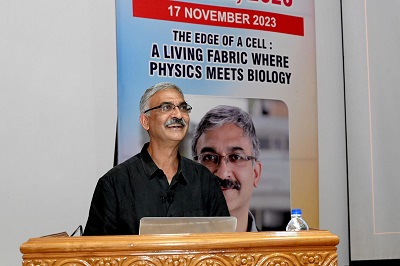Thiruvananthapuram, (Samajweekly) Satyajit Mayor, former Director of Bengaluru-based National Centre for Biological Sciences (NCBS) and DBT-InStem, on Friday said that in the modern age, study of biological science should be seen more as a study of how interdisciplinary work can address a particular problem in an exciting manner.
“Not that you need to be a particular biologist who does one thing. If you can bring people who look at phenomena at different disciplines, it becomes much more exciting to address problems,” Mayor said while delivering a lecture on ‘The Edge of A Cell: A Living Fabric Where Physics Meets Biology’ at Rajiv Gandhi Centre for Biotechnology (RGCB), in connection with the Foundation Day of the institution, which falls on November 18.
He said that it is an exciting meeting of physics and biology when we witness the nature of the relationship between concepts that we borrow in one area and realise how we can apply them in biology.
RGCB Director Prof Chandrabhas Narayana, in his welcome address, briefly recalled the emergence of RGCB as a premier biotechnology research institution in India since its inception in 1990.
He said that while the foundation stone for the new building of RGCB was laid on November 18, 1995 by the then Prime Minister P.V Narasimha Rao at Thiruvananthapuram, the institution was dedicated to the nation by the then President of India A.P.J. Abdul Kalam, on November 18, 2002.
He said that RGCB has consistently maintained its commitment to research and knowledge dissemination and further enriched the scientific content within their six thematic scientific domains by publishing high quality research articles.
Noting that RGCB has introduced several advanced equipment this year, he said an incubation hub consisting of the state-of-the-art animal research facility and advanced instrumentation centre to facilitate RGCB’s research is coming up as part of the first phase development at its Akkulam campus in the capital city.










